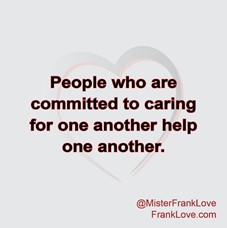 In my previous blog, “Care,” we looked at paying attention to nuance in our loving relationships.
In my previous blog, “Care,” we looked at paying attention to nuance in our loving relationships.
I love having conversations with individuals who are highly motivated to fulfill their passion or pursue their goal. It’s great to hear how they are truly “going for it.” And because it relates to my passion, I’m always interested to hear stories of how their partners support them, their goal, and their mission. I also hear stories about the refusal of a partner to support or participate in the other’s goals. When that happens, I have heard one universal feeling (to varying degrees) relayed by the partner with the goal: “It hurts.”
Before delving into this issue, let’s clarify that the partner who is divested, or appears to be divested, of their partner’s effort is not hurting their partner. There is a difference between, “It hurts” and, “My partner is hurting me.” These are not interchangeable sentiments. One is an explanation of an experience at a given point in time. The other is a projection that suggests the experience is someone else’s fault.
I have personally experienced the enrichment that comes from a partner’s support. I don’t think I’ve ever written about my first wife on my blog. She was incredibly supportive of my writing. I have sung her praises as a powerhouse editor and writer to various people and even to her. If I recall correctly, her major was English, and from the time I met her until we split, she was generally willing and able to read and review anything I wrote (a letter, a research paper, a presentation) and give me valuable feedback. She was wonderful in this way, and it was a great experience and a deep area of connection. Kudos to her for her skill and willingness to support me with that skill.
While that was my experience, it certainly hasn’t been everyone’s. I know an individual in a relationship who asked their partner, “Is there one hour a week that you are willing to give to my business?” The first time the request was made, the partner said, “I’m not sure.” After the second request, “I’ll have to let you know.” The third time, “I’ll get back to you.” Reading between the lines, the answer was simply, “No, I won’t help you for one hour a week.”
A certain business concept may not be a partner’s area of expertise. The business may not be of interest to a partner. We might not care about running an ice cream shop or an elite sportswear company. But hopefully a partner cares about the business owner. And people who care for one another help one another. “I care about what you care about because I care about you.” It may be a mouthful, but it tends to be true. Yet many of us are unwilling to say it and, even worse, unwilling to think it.
If we’re wondering Am I supportive? or Is there a way I can be supportive (or more supportive)?, consider that businesses can use almost any skill set. We may bring a few obvious strengths such as accounting, legal counsel, social media presence, or graphic design. However, there is also work like taking out the trash, filing, research, or answering phones. We can jump in wherever we can.
Have you ever had an experience where you were working on something and someone came along and helped you unexpectedly? Didn’t it feel great and refreshing? Often that assistance was provided because that person simply cared about you.
Here is the appeal: let’s give our partners our time and energy. Honestly, there are few, if any, entities or efforts more worthwhile for investment than our partners. Through partnership we create and hopefully raise our children. Through partnership we can encourage one another. Through partnership we can support one another.
 Let’s keep the tremendous impact that we can have on our partners in mind as we move through our days, weeks, months, and years. What or who is more worthy of our time and energy than our partners? Perhaps we can examine what are we making more important or what’s preventing us from giving them our time and energy.
Let’s keep the tremendous impact that we can have on our partners in mind as we move through our days, weeks, months, and years. What or who is more worthy of our time and energy than our partners? Perhaps we can examine what are we making more important or what’s preventing us from giving them our time and energy.
If we don’t have an hour a week to give, is a half hour doable? Keep in mind, the noted time commitment may be indirect, i.e., you may help by finding someone to help. If sixty or thirty minutes isn’t possible, consider what that says to our partner and also consider how our partner may be feeling. If we understand that we are communicating apathy and, even worse, disdain, consider a change or a recalibration. There may be a new level of loving that is lying dormant in the relationship; it may be a ripe opportunity where both parties benefit. And it can be very loving.
Keep Rising,
Frank Love
In my next blog post, “How To Be Friends with an Ex When We Are in a Relationship (and Want To Be Transparent),” I will talk about some helpful guidelines for maintaining a friendship with an ex.
Watch Frank Love’s presentation “The Act of Caring.”
Subscribe to receive Frank’s weekly blog.
Become a sponsor of Frank Love and his work creating loving cultures in our relationships with a monthly contribution of as little as $2. Sign up today at Patreon.com/FrankLove.
–—–—–—–—–—–—–—–—–—–—–—–—–—–—–—–—––
Each week, Frank Love hosts Zoom support group meetings that assist women and men as we work to create a loving culture in our relationships. Calls occur from 7 p.m. to 8:30 p.m. EST and can be accessed by visiting FrankWeeklyCall.com.
- Tuesdays—Black Women: Creating a Loving Culture in Our Relationships
- Thursdays—Black Men: Creating a Loving Culture in Our Relationships
–—–—–—–—–—–—–—–—–—–—–—–—–—–—–—–—– –
Frank Love coaches individuals toward creating a loving culture in their family. He is also the author of Relationship Conversations You Don’t Want to Have (But Should Anyway) and 25 Ways to Be Loving. To schedule a free consultation, contact Frank at Frank@FrankLove.com.

